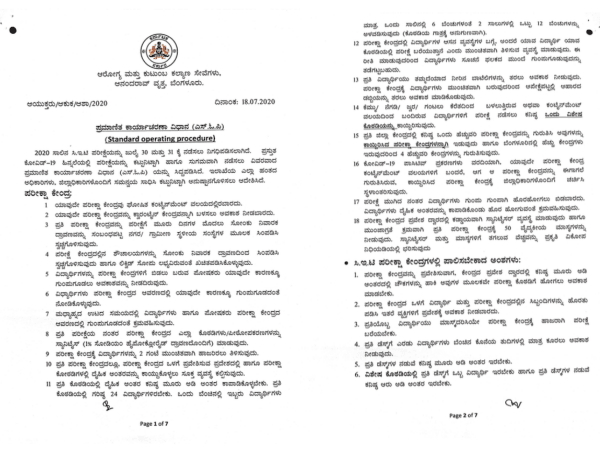![[Representational image] Office](https://data1.ibtimes.co.in/en/full/666499/office.jpg?h=450&l=50&t=40)
The Karnataka CET exam is going ahead as scheduled, despite protests by students and parents around the state. The Karnataka government has, however, issued stern SOPs with instructions on how to conduct the exams.
The exam on which the future of numerous students around the state rides, will see COVID positive students also writing the exam which calls for even more caution.
Karnataka CET SOP to conduct exams
The Health and Family Welfare Department of Karnataka has issued Standard Operating Procedures for the smooth conducting of the Common Entrance Test. This test scheduled for 30th and 31st July, becomes a doorway for students into public universities in the state based on their score specifically for engineering and sciences.
This time however the exams will be conducted differently keeping in mind the ongoing pandemic. In a new move, COVID-19 positive candidates will also be allowed to write this exam, while being seated in a 'special room' at the centre.
The guidelines for the Exam centre are as follows:
- There will be no exam centre in containment zones
- No exam centre should be used as a quarantine centre
- Every exam centre should be sanitised 3 days before the exam by sprinkling cleaning solutions.
- Toilets at the exam centre must be cleansed and liquid soap must be compulsorily made available.
- Parents who come to the exam centre should not be allowed to gather for any reason.
- Nobody is allowed to form groups in the area of the exam centre.
- At lunchtime, students and parents can't form groups.
- After every exam, the centre, rooms and furniture must be sanitized as per the procedure.
- Students should reach the exam centre, 2 hours in advance.
- At every centre at the entrance and in rooms, the social distance must be strictly adhered to.
- In every room, a minimum of 3 feet of social distancing must be followed. In every room a maximum of 24 students. On one bench 2 students can be seated at a time only, one row should have 6 benches and 2 rows can have 12 benches.
- At the centres seating arrangement should be known beforehand so students don't crowd around the notice board.
- Every student must bring their own water bottle and in case they need, food too.
- Those showing symptoms of cold, cough, fever, and throat irritation or are from containment zones, should be seated in special rooms.
- In every district, a minimum of one or more centres should be identified as emergency centres. In Bengaluru, more up to 4 centres need to be identified.
- If COVID-positive cases arise and the centres are in containment zones then the centre needs to be shifted to one of the emergency centres.
- After the exam, no groups are allowed to be formed and social distancing needs to be maintained.
- At the exam entrance, complete sanitization arrangements need to be made, and as a precaution 50 medical masks will be issued to every centre, and the cost of masks and sanitiser will be allotted from the emergency fund.

The SOP further states that after the exam, special rooms where COVID-positive cases and those from containment zones are writing need to be sanitized within 30 minutes and used only after 24 hours. People from other countries and states will also be allowed to write the exam and will be exempted from quarantine restrictions for the purpose of the exam.

Exams amid the pandemic have become a huge risk undertaken by both parents and students. The Karnataka government has so far been firm on its stance when it comes to state-wide exams like K-CET, SSLC and PUC. Parents have been arguing that despite restrictions clusters of cases cropped up which put students at risk.

















